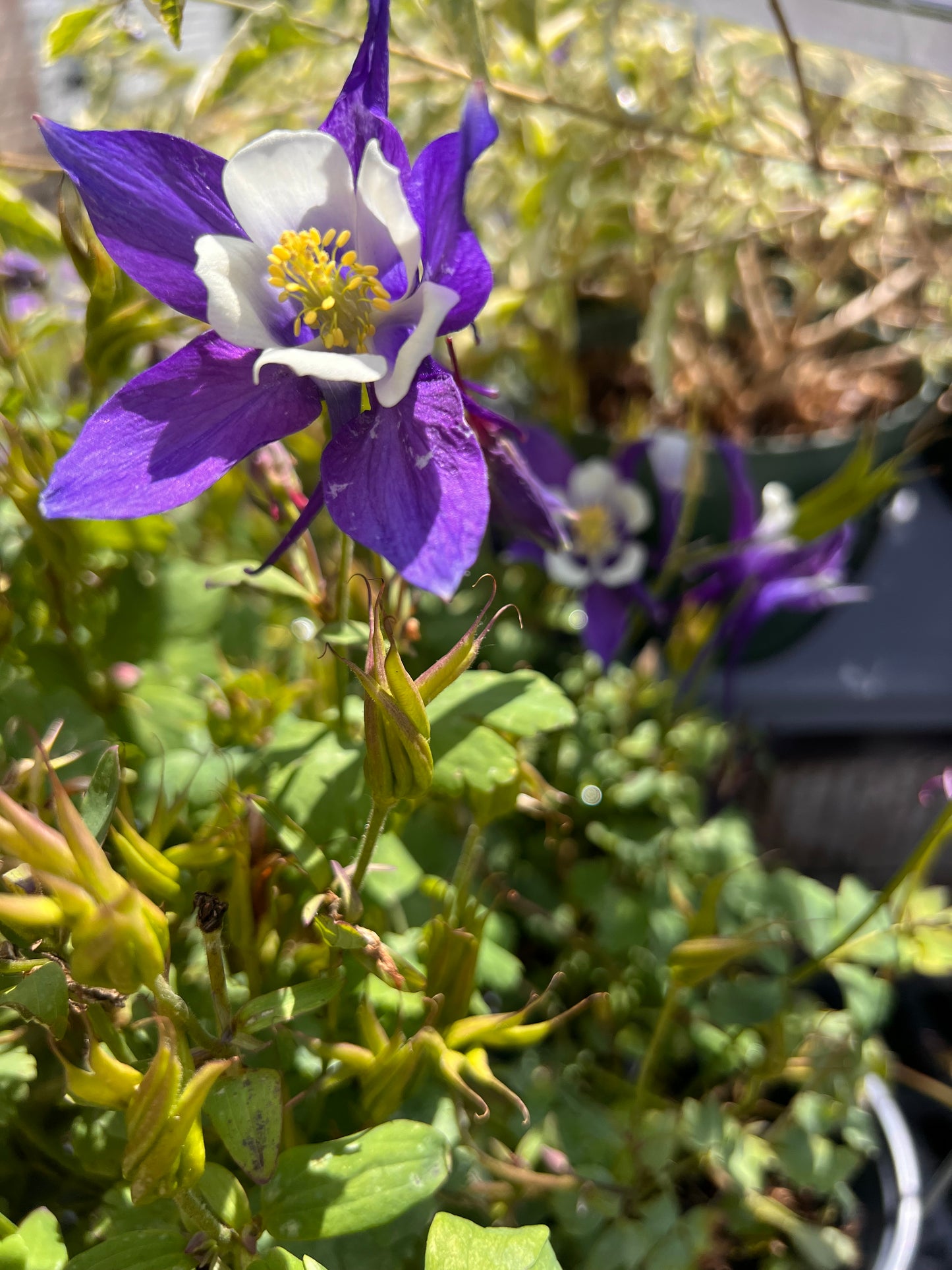AQUILEGIA KIRIGAMI PURPLE/BLUE COLUMBINE
AQUILEGIA KIRIGAMI PURPLE/BLUE COLUMBINE
Aquilegia, commonly known as Columbine, is a genus of around 60-70 species of perennial plants known for their distinctive, spurred flowers. Columbines have delicate, fern-like foliage and are highly attractive to pollinators like hummingbirds and butterflies.
Hardiness Zones: Aquilegia is suitable for USDA hardiness zones 3-9.
Height and Width
Height: Typically grows to a height of 1-3 feet (30-90 cm), although some species and cultivars may vary.
Width: Spreads to a width of about 1-2 feet (30-60 cm).
Uses
Ornamental: Valued for their unique, nodding flowers and delicate foliage, making them ideal for garden beds, borders, and woodland gardens.
Pollinator Gardens: Attracts hummingbirds, butterflies, and bees, making them excellent for wildlife gardens.
Cut Flowers: The flowers are suitable for floral arrangements due to their long-lasting blooms.
Native Range
Native to: The native range of Aquilegia species is broad, covering temperate regions of the Northern Hemisphere, including North America, Europe, and Asia. In North America, they are commonly found in meadows, woodlands, and mountainous regions.
Planting and Care
1. Site Selection: Choose a location with partial shade to full sun. In hotter climates, providing some afternoon shade is beneficial to prevent the plants from overheating.
2. Soil: Prefers well-draining, fertile soil. A slightly acidic to neutral pH (6.0-7.0) is ideal. Adding compost can improve soil fertility and drainage.
3. Watering: Water regularly, keeping the soil consistently moist but not waterlogged. During dry spells, ensure the plants receive adequate water to prevent wilting.
4. Fertilization: Apply a balanced, slow-release fertilizer in early spring. Additional feeding during the growing season can promote better flowering and foliage growth.
5. Mulching: Apply a 2-3 inch layer of mulch around the base of the plants to retain soil moisture and suppress weeds.
6. Pruning: Deadhead spent flowers to encourage continuous blooming. In late fall, cut back the foliage to the ground to prepare for winter dormancy.
Pests and Diseases
Pests: Watch for common garden pests such as aphids, leaf miners, and sawfly larvae. Neem oil or insecticidal soap can be used to manage infestations.
Diseases: Ensure good air circulation to prevent fungal diseases such as powdery mildew and leaf spot. Avoid overhead watering to reduce the risk of foliar diseases.
Additional Tips
Self-Seeding: Columbines often self-seed, creating new plants around the garden. This can be beneficial for naturalizing areas, but unwanted seedlings can be removed to control spread.
Companion Planting: Pair Aquilegia with other shade-tolerant perennials like hostas, ferns, and astilbes for a lush, diverse garden display.
---SHIPPING NOTICE PLEASE READ BEFORE PURCHASING LIVE PLANTS!---
We WILL NOT refund the purchase of or the shipping cost of live plants purchased with the intent to be shipped to states that do not authorize importing live plants or to states with restrictions! Purchases to these states will be held for 30 days for pick-up at our Slidell, Louisiana store and the shipping cost associated with these purchases will be held for the care of the plant while waiting to be picked up. All sales are final. If the plant(s) purchased are not picked up within 30 days from the date of order, these items will be returned to our sales inventory and you WILL NOT be refunded. Thank you for understanding these policies.
Due to regulations, certain states have restrictions on importing plants. Please review the list below to ensure you're not attempting to order any restricted plants in your area.
**Important Note:** We do not ship any plants outside the U.S.
State-Specific Restrictions - We ARE NOT responsible for any plant(s) that are not listed in these restrictions. Purchaser bears all responsibility for making sure the plant(s) they desire to purchase are not banned from being imported to the shipping state:
Arizona: Juglans spp.
California: Castanea spp., Juglans spp., Pinus spp., Quercus spp.
Colorado: Some counties restrict Prunus spp. Please verify your local county regulations.
Florida: Castanea spp., Cornus spp., Quercus spp., Cornus mas
Georgia: Vaccinium spp.
Hawaii: Pinus spp.
Idaho: Humulus lupulus, Mentha spp., Vitis spp.
Indiana: Fragraria spp., Rosa spp.
Kansas: Juglans spp.
Michigan: Abies spp., Vaccinium spp.
Montana: Pinus spp.
Nevada: Allium spp.
Mentha spp.
New Jersey: Rosa spp.
New York: Vitis spp.
Oregon: Allium spp., Castanea spp., Corylus spp., Humulus lupulus, Quercus spp., Sambucus nigra, Ulmus spp., Vaccinium spp., Vitis spp.
Texas: Juglans spp.
Washington: Allium spp., Castanea spp., Corylus spp., Humulus lupulus, Vaccinium spp., Vitis spp.
Wisconsin: Abies spp., Pinus spp., Picea spp., Mentha spp.
Additionally, we cannot ship plants in soil medium to the following states: AK, AL, AR, AZ, CA, HI, ID, KS, MS, MT, ND, NM, NV, OK, OR, SD, TX, UT, WA.
Couldn't load pickup availability


